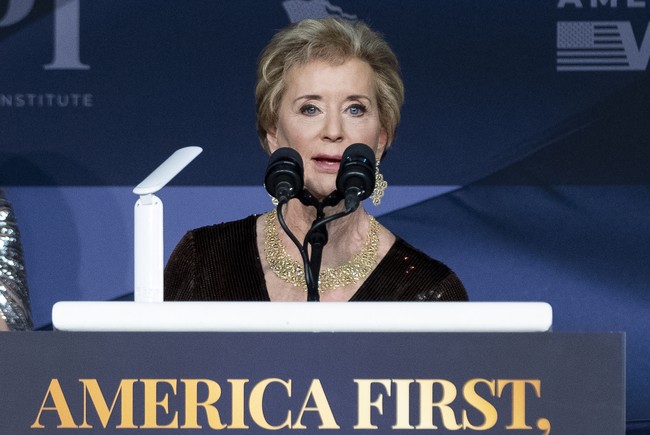For the last 44 years, Republicans and conservatives have demanded an end to the Department of Education. Can Donald Trump succeed where others have either failed or never tried much in the first place? And will appointing a former entertainment CEO provide the catalyst for real change in education policy?
That’s certainly what Trump plans. Rather than focus on reforming the Department of Education, Trump envisions an end to federal involvement under McMahon’s direction:
As a political force, however, she has been a “fierce advocate” for transforming the nation’s educational system in a way that Mr. Trump supports, he said when announcing her selection.
Chief among those policies is school choice, meaning that some money that would normally flow to public schools will instead go to families, who can spend it on private education. This was a major push under Mr. Trump’s previous education secretary, Betsy DeVos. Since then, more states have instituted this policy through taxpayer-funded voucher programs.
“As Secretary of Education, Linda will fight tirelessly to expand ‘Choice’ to every State in America, and empower parents to make the best Education decisions for their families,” Mr. Trump said.
Mr. Trump also said Ms. McMahon’s business experience, including as the former chief executive of World Wrestling Entertainment, would help her spearhead an effort to “send Education back to the states” — a reference to one of his key education campaign pledges: to reduce or eliminate the federal Department of Education.
These are easier said than done, and it’s not clear that demolition is the priority. One proposal McMahon has floated is to expand Pell grants to students at for-profit universities and trade schools, which will increase the program costs or perhaps just shift funds away from traditional universities. The latter would be a welcome change, given the radical nature of Academia these days, but it extends the problems of price signaling and does nothing to eliminate federal jurisdiction in education.
Tommy Schultz has more optimism on all counts, however. The CEO of the American Federation for Children advocates for school choice and reduction of federal authority, and sees a wide opening for McMahon both administratively and legislatively for a transformation of the Department of Education. We spoke at length yesterday about the challenges that the new administration faces, and what the priorities should be in both the short and long runs.
Here are a few lightly edited excerpts from the transcript:
Ed: How do you take what’s already a 45-year-old federal department and unwind it? Do you do it through a process of dropping it down to block granting to states? And then just simply sort of eliminate it? Does Congress really have to be the driver on this? These are all really interesting questions that McMahon’s appointment sort of opens up.
Schultz: So lots to unpack there. I mean, when you’re talking about kind of the constitutional nexus here and how this creature kind of came about in the late 1970s, even the Washington Post, I posted an article that they wrote in, I think, of an op-ed, an editorial, you know, talking about how they’re like, you know, look, the teachers’ unions have had unbelievable sway over our education system, building out this department.
These are the Washington Post words, right? They said, building out this department, it’s just gonna be a new thing for this creature, and this creature that we are creating, frankly, their support base is the unions. That’s gonna be their primary customer. It won’t be the parents. …
Ed: You mentioned Title I. Those can be handled by the Department of Justice because those are actual law enforcement. It’s part of federal law. We don’t need the Department of Education to do that. That’s a Department of Justice issue, not a Department of Education. And if you move it to the Department of Justice, then it becomes a much more formal and transparent criminal procedure or even level procedure, but it is in terms of an administrative procedure at the Department of Education.
I very much distrust administrative procedures. And I think the Department of Education is one of the worst places for it, especially in terms of due process for Title IX enforcement, right?
Schultz: … So, again, get those things, you know, Title IX enforcement, you know, fix that legislatively, get all the things already that the department can’t do and isn’t really, you know, litigating or, you know, advocating for correctly in the courts, you could just put that over Department of Justice. You’re totally right in the direction this needs to go because the more and more that you give Department of Education power or even influence, I mean, Obama, the Obama administration on the way out in, you know, 2013 and 14, pushing out these Dear Colleague letters when it came to kind of student discipline issues, the school districts all kind of went, you know, ran amok when they got the letters, even though it wasn’t really a legal letter, didn’t it?
You know, they couldn’t actually said they were just kind of putting out these threats there. Huge chilling effect on our school districts. It’s why you’re seeing, you know, it’s why you’ve seen this kind of huge wave of violence in schools over the last 10 years, frankly. Again, just because of a little letter that somebody in the Department of Education writes and that they send out, you know, to the 13,000 or so school districts across the country.
Ed: I like to refer to those letters as the ‘nice business you’ve got there’ letters.
Schultz: You’re right. Exactly. It’s kind of a mafia shakedown tactic or something like that.
===
The full interview is here:
The Ed Morrissey Show is now a fully downloadable and streamable show at Spotify, Apple Podcasts, the TEMS Podcast YouTube channel, and on Rumble and our own in-house portal at the #TEMS page!
Read the full article here






![Hooded Gunman Targets Insurance CEO’s Home in Oregon [WATCH] Hooded Gunman Targets Insurance CEO’s Home in Oregon [WATCH]](https://www.rvmnews.com/wp-content/uploads/2025/02/2025.02.28-12.18-rvmnews-67c1a9b313c97.jpg)


